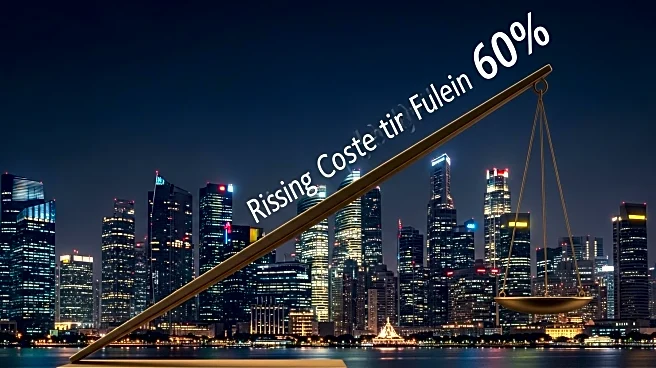What's Happening?
Rents in New York City's wealthiest neighborhoods have surged by more than 60% since the pandemic, according to a Bloomberg News analysis. Areas like Tribeca and SoHo have seen the sharpest increases, with median asking rents nearing $8,000 a month. This rise has affected even high-earning professionals, who are now facing bidding wars typically reserved for homebuyers. The citywide rent increase of 27% from 2020 to 2024 has outpaced other major cities like Los Angeles and Boston. Economists attribute the surge to landlords recovering from Covid-era losses, high interest rates keeping potential buyers in rentals, and a wave of luxury developments. Long Island City alone added nearly 7,200 new apartments, with rents significantly higher than typical units.
Why It's Important?
The rent increases in NYC's affluent neighborhoods highlight a growing affordability crisis, affecting even those with substantial incomes. This trend underscores the broader economic challenges facing urban areas, where high demand and limited affordable housing options are pushing rents upward. The situation is exacerbated by the influx of wealthier renters post-pandemic, contributing to a competitive rental market. The affordability issue is becoming a central topic in local politics, influencing mayoral races and policy discussions. As more households allocate a significant portion of their income to rent, the economic strain could impact consumer spending and overall economic growth in the region.
What's Next?
The ongoing rent crisis in NYC is likely to continue influencing political campaigns and policy proposals. Mayor Eric Adams has promoted his 'City of Yes' plan to increase housing supply, though critics argue it primarily benefits wealthier residents. Democratic socialist Zohran Mamdani has gained traction with promises to freeze rent hikes on stabilized units, appealing to voters in neighborhoods hit hardest by rent increases. The debate over affordable housing solutions is expected to intensify, with potential implications for future development and rental market regulations.
Beyond the Headlines
The rent surge in NYC reflects broader economic shifts, including the growing divide between high-income and low-income residents. The trend raises ethical questions about housing equity and the role of government in ensuring affordable living conditions. Long-term, the city's ability to attract and retain diverse populations may be challenged, impacting cultural and economic vibrancy.










